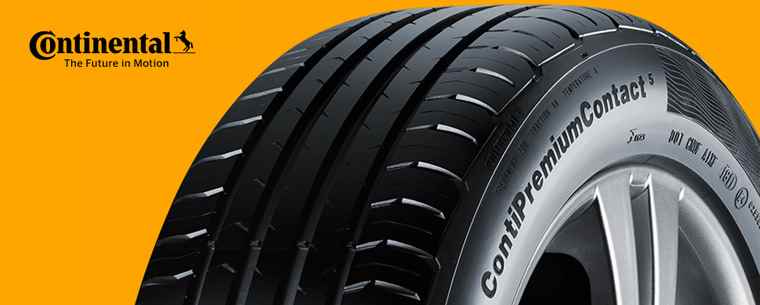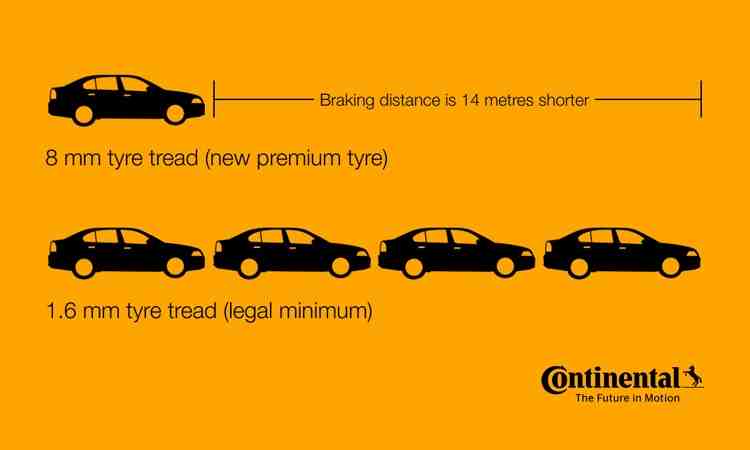Have you checked your tread depth recently?
| Monday 30th July 2018 10:00am

There are many statistics surrounding driving. In 2016, there were 37.1 million vehicles licensed for use on UK roads, with 1.87 billion miles driven by cars and almost 180,000 casualties. Of the casualties, 1,792 were fatalities- the highest since 2011. Ensure that your car is both safe and legal by checking your tyre tread depth weekly or before long journeys. The legal limit is 1.6mm which sounds like a small amount but can make the difference between a safe drive and an accident occurring.
As your tyres are the only point of contact between your vehicle and the road, it is crucial that your tyres are in good condition for vehicle safety. If your tread depth is too low, your tyres will not be able to remove enough water from the road’s surface to ensure that grip is maintained. However, drivers often don’t realise the importance of tread depth and ensuring that it is maintained.
Braking distances and the threat of aquaplaning
Although the legal minimum tread depth in the UK is 1.6mm, tyre experts, such as Kwik Fit, and premium tyre manufacturer, Continental, recommend not allowing your tread depth to wear down below 3mm. Independent braking tests show that the braking distance with tyre tread depth at 1.6mm is almost double the distance at 3mm in wet conditions.
As you can see above, the difference in stopping distances for vehicles fitted with summer tyres on a wet road is clear even at fairly low speeds. This difference in stopping distances increases the likelihood of an accident, especially in areas where school children might be crossing.
The chances of aquaplaning also increase with low tread depth. Aquaplaning occurs when tyres lose contact with the road and travel on top of the water, this leads to a total loss of control for the driver. Often drivers will get control back. However, if this doesn’t happen then there is a high chance of accidents.

Tyre tread wear differs from driver to driver
Premium tyres, such as the ContiPremiumContact™ 5 are created with 8mm of tread depth. This allows the tyre to remove water quickly from the road’s surface, improving grip and driver safety. However, not all tyres are the same in terms of the way their tread wears.
Factors that contribute to tyre wear are how the car is driven and the compound the tyre is made from. For example, a driver completing a large number of miles at high speeds will see their tyres deteriorate faster than someone making shorter journeys. The superior compounds used in premium tyres will wear down more slowly than cheaper tyres. However, all tyres wear down eventually so it is important to check your tread depths weekly or before long journeys.
How to check your tyre tread depth
Whilst tread depth gauges are available, you can easily check your tread depth yourself using the “20p Test”. Simply place the coin into the grooves of your tyres and see if the coin’s outer band is hidden. If it is, then your tread is above the legal minimum. However, if you can see the outer band of the coin then your tyres may be illegal. This runs the risk of a fine of £2,500 and three penalty points on your licence for each tyre below the legal limit.
Unsure about tyre tread depths? Talk to Kwik Fit
To ensure that your tyre tread depths are safe and legal, contact your local Kwik Fit. You can find your nearest centre here.
Any facts, figures and prices shown in our blog articles are correct at time of publication.
Featured Articles
Is it Illegal to Drive With One Headlight?
Saturday 19th July 2025
Wondering if it’s illegal to drive with one headlight? Learn about the safety risks and penalties of illegal blown bulbs and why you should fix them promptly.
Air Con in EVs & Hybrids: Experts Answer Your Questions
Monday 30th June 2025
Does air con drain EV batteries? Can you use the air con while charging an electric car? Find out the answers to these questions & more from Kwik Fit’s experts.
Why Is Your Car Making a Noise? Fixes & Tips
Friday 13th June 2025
When your car starts making unexpected noises, it can certainly be quite disconcerting; it may be nothing to worry about, but here’s what you need to know.









